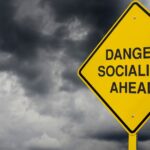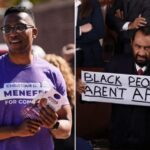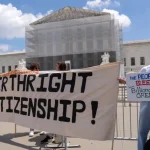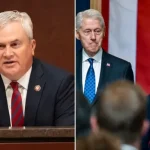
Last year, Cardinal Wilton Gregory of Washington “called on the US Congress to show courage and compassion and to seize the opportunity to improve the rights of undocumented migrants,” Vatican News reported.
He claimed that the Roman Catholic Church “upholds the teaching that every person has the right to live in his or her own homeland in security and dignity, with opportunities for work.”
“However,” he said, “when the loss of these rights forces individuals to migrate to other lands, we must welcome them, protect them, and generously share our abundance with them.”
That public statement by the cardinal reflects a growing activism among many on the religious left. This by no means reflects positions espoused by Catholic Church leaders only. Many religious denominations have expressed similar views.
It is unfortunate that religious leaders would engage in partisan political rhetoric, but it has become a common occurrence. The cardinal’s statement is misleading for several reasons.
Trending:
First, there is no formal Christian doctrine such as that espoused by Cardinal Wilton. There is no Christian teaching that any country should have open borders.
Cardinal Wilton did not quite claim that there is such a dogma, but he came close. “When the loss of these rights forces individuals to migrate to other lands, we must welcome them, protect them, and generously share our abundance with them.” By speaking in a public forum in his position as a cardinal, he was implying that there is such a doctrine. For him to do so was dishonest.
The foremost Catholic theologian on church dogma was Thomas Aquinas. Nowhere in his teachings does there appear any implication that a country must open its borders to those who are not citizens. To the contrary, Aquinas stated that it is within the proper role of the government to control and protect the country’s borders and its citizens from all threats, and to restrict immigration.
On the question of citizenship, Aquinas recognized that government has a legitimate duty to ensure that immigrants are properly assimilated into society before they can become citizens. Aquinas did not specify a particular length of time that might be required for assimilation, but he did quote with approval Aristotle, who stated that it might require two or three generations before an immigrant could be properly assimilated into society and be eligible for citizenship.
Cardinal Wilton was not expressing a religious teaching; he was expressing his own personal political point of view. He is entitled to his political opinion, as all Americans are. But it is dishonest to use his position as a member of the clergy to represent or imply that this leftist opinion represents a formal teaching of his religion. It does not.
Are open borders a requirement of Christian teaching?
Yes: 0% (0 Votes)
No: 0% (0 Votes)
A second reason that his statement is misleading is that the masses of immigrants did not simply “lose their work.” In many instances, they chose to lose their work. They voted to lose their work. Losing their work was an inevitable consequence of their choices of leftist governments.
The left has boasted about a “pink tide” that has been sweeping Latin America. This term refers to the political movements in many Latin American countries toward left-leaning governments. The most notorious of these are Cuba and Venezuela.
Hugo Chavez was first elected president of Venezuela in 1998. He was re-elected three times. The results of his policies, which have been continued by his successor Nicolas Maduro, have been catastrophic. Venezuela descended from one of the most affluent countries in the world to one of the poorest today.
While there are some differences of opinion about which countries are part of the pink tide, there is no doubt that places like Mexico, Argentina, Bolivia, Honduras, Chile and Colombia have in recent years moved sharply to the left.
We know what that means. Leftist government economic policies invariably lead to greater income disparity and greater poverty. They always do.
That in turn will lead to greater pressures on America’s borders, as citizens of those countries vote with their feet when they experience the consequences of their votes. The pink tide of leftist governments is always succeeded by a wave of immigration by those suffering from their policies.
And that is really what this is about. Those on the left hope and expect that illegal immigration will be followed by a path to citizenship, which will be followed by growth in the voter rolls that favors the left. That is why leftist political leaders in the U.S. want to import these new voters.
When they become naturalized citizens, they will vote the same way they did in their parent countries. They will vote so that many Americans will also “lose their work.”
That seems counterintuitive. One would think that those immigrants would have learned from their experience with socialist governments that it always ends badly. But data on voting patterns in the U.S. shows that that is not so.
If religious organizations truly wish to serve the poor of Latin America, they have had more than sufficient opportunity to do so. The Latin American countries from which these immigrants have come are all predominantly Christian countries. The Christian churches in those countries are very influential.
There was plenty of opportunity to help them in their home countries before they “lost their work.” The religious leaders might have helped them by educating them about the many blessings of free market capitalism and the horrors of socialism.
Those religious leaders chose not to do so. They preferred to remain silent on that subject. If they had truly wanted to serve the poor, that would have been the way to do it. And they failed badly.
The views expressed in this opinion article are those of their author and are not necessarily either shared or endorsed by the owners of this website. If you are interested in contributing an Op-Ed to The Western Journal, you can learn about our submission guidelines and process here.






